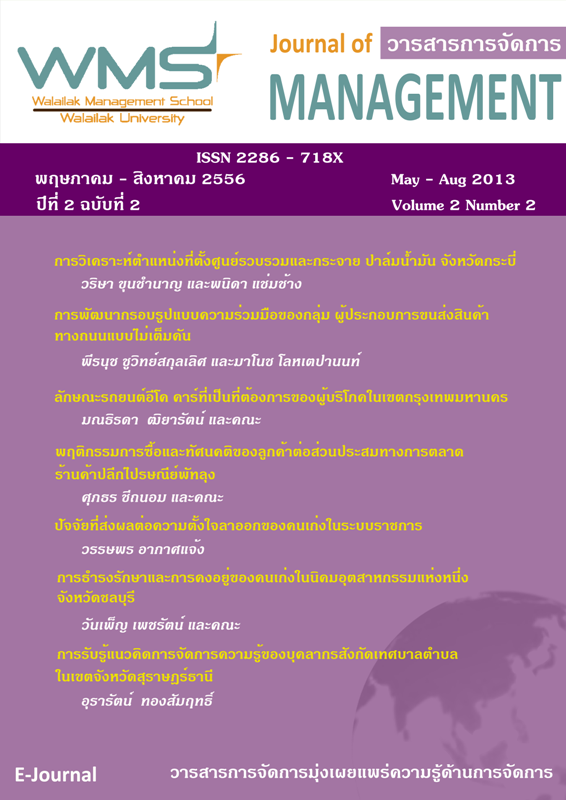Talent Retention and Intention to Stay of Talented People in an Industrial Estate, Chonburi Province
Main Article Content
Abstract
Article Details
References
กฤติน กุลเพ็ง. 2552. ไม่อยากเสียคนเก่งในองค์กรต้องทำอย่างไร. กรุงเทพฯ: เอช อาร์ เซ็นเตอร์.
จิดาภา เสน่ห์นุช. 2553. ปัจจัยที่มีความสัมพันธ์กับความตั้งใจที่จะลาออกจากงานของเภสัชกรที่ปฏิบัติงานในองค์กรเภสัชกรรม. สารนิพนธ์บริหารธุรกิจมหาบัณฑิต, สาขาการจัดการองค์กรเภสัชกรรม, มหาวิทยาลัยศรีนครินทรวิโรฒ.
จุฑาทิพย์ สุขสวัสดิ์. 2555. การบริหารคนดี คนเก่งของสถานประกอบการในเขตนิคมอุตสาหกรรมอีสเทิร์นซีบอร์ด จังหวัดระยอง. วิทยานิพนธ์การจัดการมหาบัณฑิต, สาขาวิชาการจัดการทรัพยากรมนุษย์, คณะการจัดการและการท่องเที่ยว, มหาวิทยาลัยบูรพา.
ธงชัย สมบูรณ์. 2549. การบริหารและจัดการมนุษย์ในองค์กร. กรุงเทพฯ: ปราชญ์สยาม.
ธีรวุฒิ เอกะกุล. 2549. ระเบียบวิธีวิจัยทางพฤติกรรมศาสตร์และสังคมศาสตร์ (พิมพ์ครั้งที่ 4). อุบลราชธานี: วิทยาออฟเซฟการพิมพ์.
นานารัก จงหาญ. 2552. สาเหตุของการลาออกของพนักงานจากโรงงานแลคตาซอย จำกัด. การศึกษาค้นคว้าอิสระบริหารธุรกิจมหาบัณฑิต, สาขาวิทยาการจัดการ, มหาวิทยาลัยสุโขทัยธรรมาธิราช.
เบญจพร โมกขะเวส. 2551. ลักษณะของธุรกิจที่มีอิทธิพลต่อการเปิดเผยข้อมูลภาคสมัครใจเกี่ยวกับสิ่งแวดล้อมของบริษัทจดทะเบียนในตลาดหลักทรัพย์แห่งประเทศไทย. คณะบัญชี, วิทยาลัยราชพฤกษ์.
ปฐมพงษ์ โตพานิชสุรีย์. 2553. การรักษาผู้มีผลสัมฤทธิ์สูงในองค์กร กรณีศึกษาข้าราชการพลเรือนสามัญ. วารสารบริหารธุรกิจ, 33(127), 35-49.
ประคัลภ์ บัณฑพลังกูร. (2550). การว่าจ้างรักษาบุคลากร. กรุงเทพฯ: บริษัท เอ็กซ์เปอร์เน็ท จำกัด.
เปรมฤดี เอื้อสิริมนต์. (2550). ปัจจัยจูงใจที่ส่งผลต่อการลาออกของพนักงาน กรณีศึกษา บมจ. อุตสาหกรรมทำเครื่องแก้วไทย. สารนิพนธ์วิทยาศาสตรมหาบัณฑิต
(การพัฒนาทรัพยากรมนุษย์และองค์กร), คณะพัฒนาทรัพยากรมนุษย์, สถาบันบัณฑิตพัฒนบริหารศาสตร์.
พิเชษ อมรรัตนวงศ์ และอัจฉรา ค้าข้าว. 2551. ปัจจัยที่ส่งผลต่อการรักษาคนเก่ง (Talent) ให้คงอยู่ในองค์กร: กรณีศึกษาผู้นำทีมบริการ บริษัท ABC จำกัด. การศึกษาอิสระหลักสูตรบริหารธุรกิจมหาบัณฑิต, โครงการปริญญาโทบริหารธุรกิจ เน้นการบริหารทรัพยากรมนุษย์และองค์การ, คณะพาณิชยศาสตร์และการบัญชี, มหาวิทยาลัยธรรมศาสตร์.คุณทหารลาดกระบัง.
วาสิตา ฤทธิ์บำรุง. 2548. การบริหารจัดการคนเก่งเพื่อสร้างความได้เปรียบทางการแข่งขันขององค์กร. สารนิพนธ์วิทยาศาสตรมหาบัณฑิต (การพัฒนาทรัพยากร
มนุษย์และองค์กร), คณะพัฒนาทรัพยากรมนุษย์, สถาบันบัณฑิตพัฒนบริหารศาสตร์.
สนธยา เผ่าดี. 2555, 29 มิถุนายน. ข้อมูลประชากรของอุตสาหกรรมยานยนต์และชิ้นส่วนยานยนต์ในนิคมอุตสาหกรรมอมตะนคร จังหวัดชลบุรี. สัมภาษณ์.
สมบูรณ์ กุลวิเศษชนะ. 2549. Retaining Talented People: (ไม่) ยากอย่างที่คิด. วารสารบริหารธุรกิจ, 29(109), 11.
สุกัญญา รัศมีธรรมโชติ. 2554. พัฒนาดาวเด่นเพื่อองค์กรเป็นเลิศด้วย Talent Management by Competency-Based Career Development and Succession Planning. กรุงเทพฯ: สถาบันเพิ่มผลผลิตแห่งชาติ, พริ้นท์ ซิตี้.
สุชาต ประสิทธิ์รัฐสินธุ์. 2551. เทคนิคการวิเคราะห์ตัวแปรหลายตัว สำหรับการวิจัยทางสังคมศาสตร์และพฤติกรรมศาสตร์ (พิมพ์ครั้งที่ 6). กรุงเทพฯ: สามลดา.
อาภรณ์ ภู่วิทยพันธุ์. 2550. กลยุทธ์การบริหารและพัฒนาพนักงานดาวเด่น. กรุงเทพฯ: เอช อาร์ เซ็นเตอร์.
Atif Anis, L.-U.-R. M. 2011. Impact of organizational commitment on Job satisfaction and employee retention in pharmaceutical industry. African Journal of Business Management, 5(17), 7316-7324.
Berger, L. A. 2004. The Talent Management Handbook : Creating Organizational Excellence by Indentifying, Developing, and Promoting Your Best People. New York: McGraw-Hill.
Bhatnagar, J. 2007. Talent Management strategy of employee engagement in Indian ITES employees : key to retention. Employee Relation, 29(6), 640-663.
Chambers, E. G., Handfield-Jones, H., & Hankin, S. M. 1998. The War for Talent. The McKinsey Quarterly, 3.
Eric, A. 2003. Retaining the Best of the Best. AFP Exchange, 23(6), 48.
Michaels, E. J. 2001. The War for Talent. United States of America: McKinsey & Company. Inc.
Pellant, K. T. 2550. การบริหารจัดการคนเก่ง. (ประภัสสร วรรณสถิตย์, แปล). กรุงเทพฯ: เอ็กซเปอร์เน็ท.
Sears, D. 2003. Sucessful Talent strategies : achieving superior business result through market-focused staffing. New York: American Management Association.

